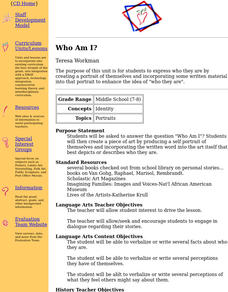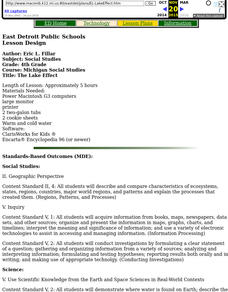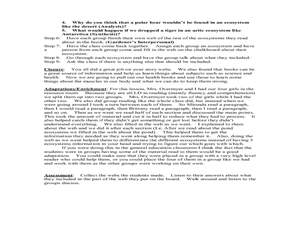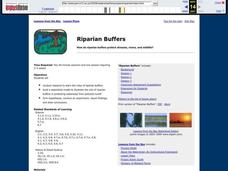Curated OER
Marine Protected Areas
Students design a research project about a Marine Protected Area they chose. In this marine biology lesson, students gather fish count and catch data then graph them. They create an information poster about their findings.
Curated OER
Statistics: Reading and interpreting production graphs
Students interpret and create different types of graphs. They analyze data from charts, develop a survey and design appropriate graphic illustrations and make a presentation.
Curated OER
Disorders of the Brain
Students, in groups, conduct research about a specific disorder of the brain, create a character study of a person with that brain disorder, and then present the information to the rest of the class.
Curated OER
Paper: Scientific Inquiry Through Chinese Art
Students create replicas of Chinese hanging scrolls in an attempt to understand the technology behind the creation and use of paper in Ancient China. This three-day lesson includes enrichment ideas.
Curated OER
Who Am I?
Students investigate the question "who am I?" They create an original self-portrait of themselves that incorporates written words. Students' self-portraits depict who they are.
Curated OER
String Instruments and Pitch
Students make predictions and explore how pitch is altered in string instruments. In this acoustic science lesson, students learn the types and parts of string instruments and create their own. They listen to classical music and identify...
Curated OER
The Incredible, Edible Cell
Students discover organelles and the functions organelles perform in cells. For this biology lesson, students create model cells using Jell-o, then dissect their "cell" to examine the parts that create a cell. Students create a diagram...
Curated OER
The Nature and Science of Technology
Fifth graders practice using the scientific method by observing and creating mold. In this bacteria instructional activity, 5th graders experiment creating their own mold and fungus using petri dishes and oatmeal. Students...
Curated OER
Light and Angles
Young scholars work together in groups to test light and how it reflects at different angles. They create their own hypothesis and answer questions given to them by their teacher. They complete the experiment at home and test if it...
Curated OER
The Lake Effect
Fourth graders conduct an experiment demonstrating the effects of water and air temperature on precipitation. They create graphs demonstrating their findings using Claris Works for Kids.
Curated OER
Treasure of the Tar
High schoolers, using an atlas, locate the region known as the "Tar Sands" in the Central Plains of Canada. They hypothesize about the future economic potential of this natural resource. They create a poster about the Tar Sands industry...
Curated OER
Community Journals
Students visit a multimedia online journal as a model for their research and journal about their own communities. They examine writing for themselves and writing for an audience as they study the community and present it in more than one...
Curated OER
Simple Machines, Odd Machine
Students create a Rube Goldberg type cartoon and research an invention. In this art inspired lesson students create their own cartoon and research inventions on the Internet.
Curated OER
Don't Forget the Three R's
Learners encourage one another in recycling. In this environment and art instructional activity, students create a new recycling bin that would help people in remembering to recycle.
Curated OER
How Powerful is Static Electricity
Students explore energy by participating in controlled electricity experiment. In this static electricity lesson, students identify the different sources that can create energy and how static electricity can be created very easily on...
Curated OER
Using Inspiration To Support Logical Reasoning
Students share descriptions of science experiments they have conducted. They create a thin film on the surface of water in order to float light objects and observe that a paper clip does, indeed, float on the surface of the water at...
Curated OER
Graphic Organizers Aid Comprehension
Students create story webs to aid comprehension of ecosystems. In this reading strategies lesson plan, students discover the importance of organizing information while reading a nonfiction text. Students produce story webs to communicate...
Curated OER
Saving Money Through Mathematics
Third graders discuss light sources and collect data about energy sources. They compare data and create a multiple line graph showing energy used by light sources for each student in the group. They present their graphs and write a...
Curated OER
Riparian Buffers
Students research the roles of riparian buffers and create a model that shows the role of the buffers in protecting waterways from pollution. They conduct an experiment from which they record their data in this unit which is spread over...
Curated OER
No Creation-No Destruction--All in a Baggie
Students investigate the concepts of conservation of mass and simple chemical reactions. Students complete lab experiments and record all observations as well as conduct experiments on their own to determine which reactions created...
Curated OER
Genetic Engineering
High schoolers are introduced to the concept of genetic engineering. In groups, they participate in a variety of experiments, in which they analyze the effect of chemicals on different substances. Using the internet, they research...
Curated OER
What Can We Lose? What Do We Lose as we Gain Force With A Lever?
Third graders view a demonstration of a teeter totter as a basis for assessing pre-knowledge of a lever. They create a KwL chart. Students work in small groups to conduct a variety of experiments. The first requires students to tie books...
Curated OER
Colorimetric Assay
Students review the basic lab techniques by following lab procedures. They analyze data by using raw data gathered. Students comprehend the processes occurring inside the column. They use specific chemicals to help determine the...
Curated OER
Bird Beak Adaptation Lab
Middle schoolers investigate bird beaks to determine which physical adaptations are necessary based on the types of food the birds eat. They participate in a lab by visiting multiple stations to determine which beaks are most efficient,...























